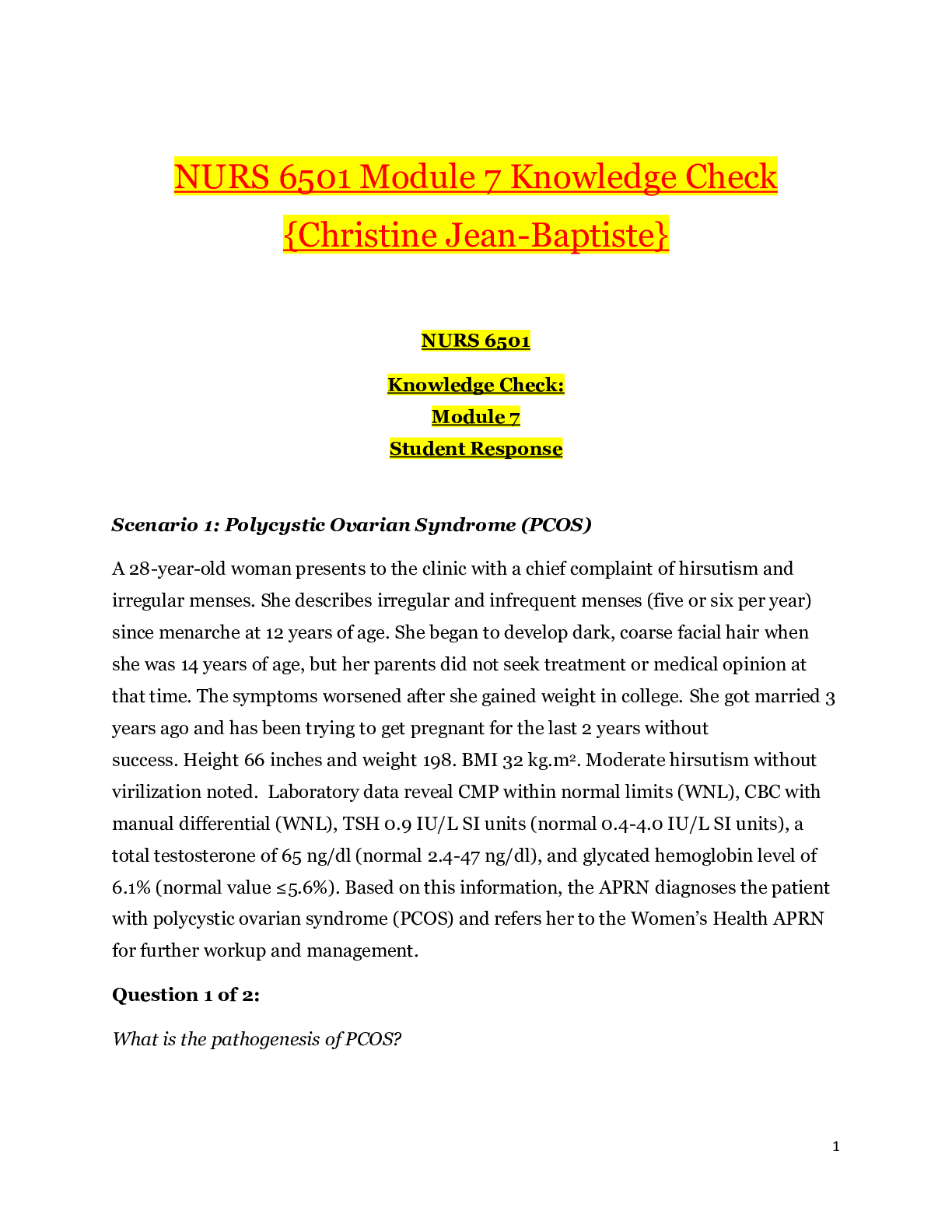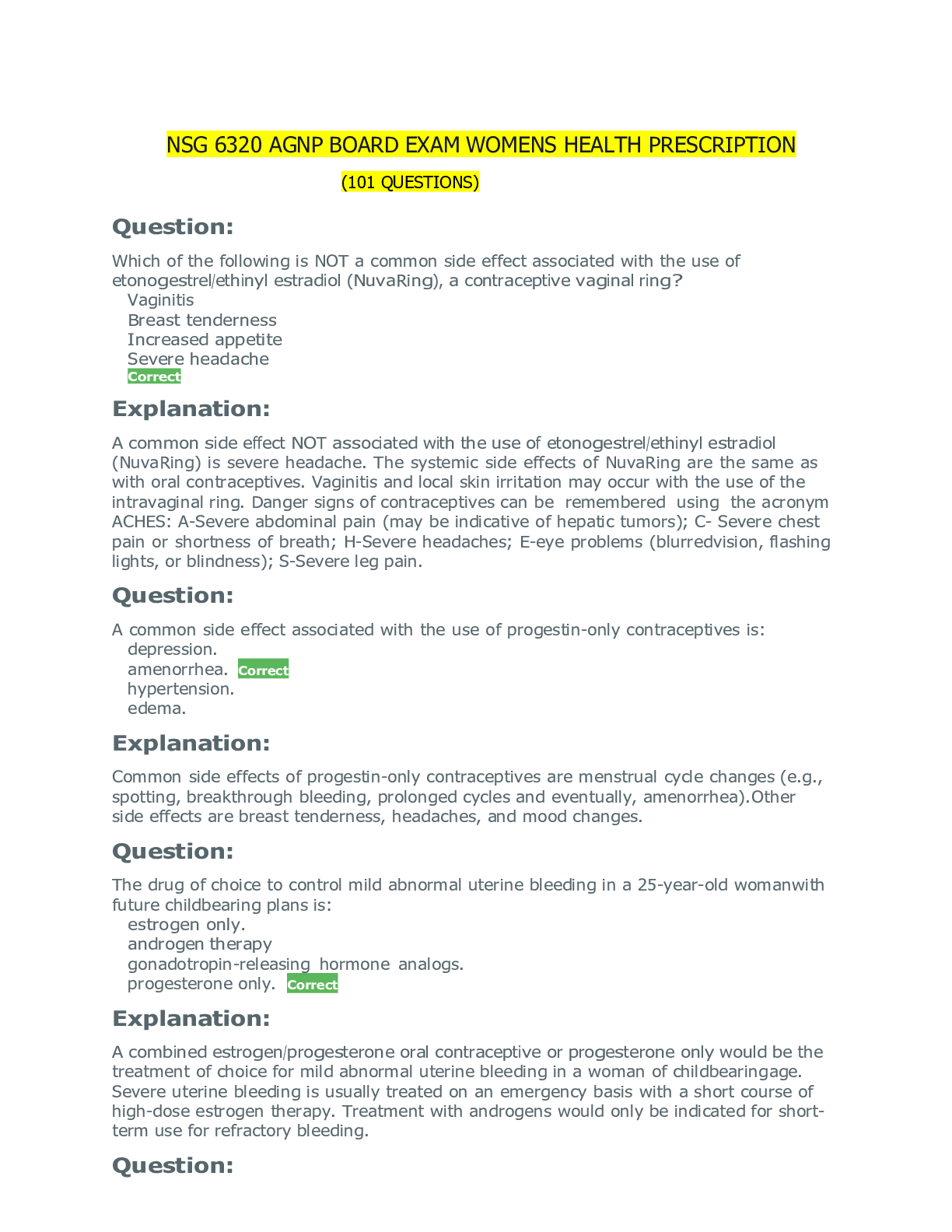*NURSING > EXAM > NSG 6320 AGNP BOARD EXAM_2020 | WOMEN’S HEALTH PRESCRIPTION (101 QUESTIONS)_100% Correct (All)
NSG 6320 AGNP BOARD EXAM_2020 | WOMEN’S HEALTH PRESCRIPTION (101 QUESTIONS)_100% Correct
Document Content and Description Below
NSG 6320 AGNP BOARD EXAM_WOMEN’S HEALTH PRESCRIPTION (101 QUESTIONS) Question: Which of the following is NOT a common side effect associated with the use of etonogestrel/ethinyl estradiol ... (NuvaRing), a contraceptive vaginal ring? Vaginitis Breast tenderness Increased appetite Severe headache Correct Explanation: A common side effect NOT associated with the use of etonogestrel/ethinyl estradiol (NuvaRing) is severe headache. The systemic side effects of NuvaRing are the same as with oral contraceptives. Vaginitis and local skin irritation may occur with the use of the intravaginal ring. Danger signs of contraceptives can be remembered using the acronym ACHES: A-Severe abdominal pain (may be indicative of hepatic tumors); C-Severe chest pain or shortness of breath; H-Severe headaches; E-eye problems (blurred vision, flashing lights, or blindness); S-Severe leg pain. Question: A common side effect associated with the use of progestin-only contraceptives is: depression. amenorrhea. Correct hypertension. edema. Explanation: Common side effects of progestin-only contraceptives are menstrual cycle changes (e.g., spotting, breakthrough bleeding, prolonged cycles and eventually, amenorrhea). Other side effects are breast tenderness, headaches, and mood changes. Question: The drug of choice to control mild abnormal uterine bleeding in a 25-year-old woman with future childbearing plans is: estrogen only. androgen therapy gonadotropin-releasing hormone analogs. progesterone only. Correct Explanation: A combined estrogen/progesterone oral contraceptive or progesterone only would be the treatment of choice for mild abnormal uterine bleeding in a woman of childbearing age. Severe uterine bleeding is usually treated on an emergency basis with a short course of high-dose estrogen therapy. Treatment with androgens would only be indicated for short-term use for refractory bleeding. Question: Nonhormonal treatments for menopausal symptoms include: benzodiazepines. copper intrauterine device. selective serotonin reuptake inhibitors. Correct antiepileptic/antiseizure medications. Explanation: Nonhormonal treatments for menopausal symptoms include selective serotonin reuptake inhibitors and serotonin norepinephrine reuptake inhibitors. Question: In the presence of mild hyperandrogenic symptoms related to polycystic ovarian syndrome (PCOS), the initial recommended treatment is: norethindrone/ethinyl estradiol (Lo Loestrin). Correct medroxyprogesterone (Provera). ethinyl estradiol (Estinyl). metformin (Glucophage). Explanation: In the presence of mild hyperandrogenic symptoms related to polycystic ovarian syndrome (PCOS), the initial recommended treatment is a combination oral contraceptive (i.e. norethindrone/ethinyl estradiol [Lo Loestrin]). Combined oral contraceptive therapy modestly inhibits gonadotropin secretion and thus gonadotropin- sensitive ovarian androgen production, and increases hepatic production of sex hormone binding globulin (SHBG), which further decreases free testosterone. Question: Which of the following medications would NOT be beneficial in the treatment of pain associated with fibrocystic breast disease? Spironolactone (Aldactone) Norethindrone/ethinyl estradiol (Lo Loestrin) Danazol Fluoxetine (Sarafem) Correct Explanation: Fluoxetine (Sarafem), an SSRI, is NOT recommended for the treatment of pain associated with fibrocystic breast disease. Spironolactone, a potassium-sparing diuretic; danazol, an androgen; and norethindrone/ethinyl estradiol, a combination oral contraceptive, may all be used for the treatment of pain associated with fibrocystic breast disease. Vitamin B6, vitamin E and evening primrose oil may be beneficial as well. Bromocriptine (Parlodel) may be used for more severe disease. Question: The copper component of the ParaGard intrauterine device to prevent pregnancy is thought to: thicken the endometrium and cervical mucus. decrease the movement of ovum through the fallopian tubes. interfere with estrogen uptake and decrease sperm motility. Correct suppress ovulation. Explanation: The copper component in the ParaGard intrauterine device is thought to prevent pregnancy by interfering with estrogen uptake, potentiating the local inflammatory response, and decreasing sperm motility. Question: The drug of choice to control mild abnormal uterine bleeding in a teenage patient is: estrogen only. androgen therapy. gonadotropin-releasing hormone analogs. combination estrogen/progesterone. Correct Explanation: A combined estrogen/progesterone oral contraceptive or progesterone only would be the treatment of choice for mild abnormal uterine bleeding in a teenager. Severe uterine bleeding is usually treated on an emergency basis with a short course of high-dose estrogen therapy. Treatment with androgens would only be indicated for short-term use to manage refractory bleeding. Question: A benefit associated with the use of medroxyprogesterone acetate (Depo-Provera), a progestin-only contraceptive, is: decreased risk of pelvic inflammatory disease. Correct decreased risk of cardiovascular risk factors. decreased risk of weight gain. decreased risk of osteoporosis. Explanation: Benefits associated with the use of medroxyprogesterone acetate (Depo-Provera), a progestin-only contraceptive, include decreased risk of endometrial cancer and pelvic inflammatory disease. Further benefits of Depo-Provera are decreased menstrual cramps, reduction in heavy uterine bleeding, decreased premenstrual syndrome symptoms, and decreased breast tenderness. Patients receiving Depo-Provera are at increased risk for experiencing a significant decrease in bone mineral density. Question: Progestin-only contraceptives: do not alter the quality or quantity of breast milk. Correct are not safe for use in women with cardiovascular disease. increase a patient's risk for pelvic inflammatory disease. are contraindicated in the presence of moderate hypertension. Explanation: Progestin-only contraceptives do not alter the quality or quantity of breast milk in lactating women. They may be used in women with cardiovascular risk factors. They are also safe for use in women who have an absolute or relative contraindication to estrogen and combined oral contraceptives, such as: age >45 years, breastfeeding, smoking, mild to moderate hypertension, well-controlled diabetes, or history of stroke or depression. Question: Late breakthrough bleeding or amenorrhea while taking an oral contraceptive may mean that the oral contraceptive has: not enough estrogen. too much estrogen. not enough progestin. Correct too much progestin. Explanation: Late breakthrough bleeding or amenorrhea while taking an oral contraceptive may mean that the oral contraceptive has too little progestin. Progesterone, LH and FSH are responsible for regulating endometrium shedding. If a woman is not pregnant, the corpus luteum disappears. The primary mechanism of action of hormonal contraceptives is that they suppress the secretion of gonadotropins (follicle-stimulating hormone, FSH and LH) through negative feedback inhibition. Question: In the prevention of pregnancy, medroxyprogesterone acetate (Depo-Provera) should be administered at least every: 4 weeks. 8 weeks. 10 weeks. 12 weeks. Correct Explanation: Medroxyprogesterone acetate (Depo-Provera), when used for the prevention of pregnancy, should be administered every 12-13 weeks. It has a 13-week period of effectiveness. Depo-Provera is classified as a progestin-only, injectable contraceptive. Question: Tranexamic acid (Lysteda), used in the treatment of abnormal uterine bleeding, should not be administered concomitantly with: nonsteroidal antiinflammatory drugs (NSAIDs). combination hormonal contraceptives. Correct statins. selective serotonin reuptake inhibitors. Explanation: Because tranexamic acid (Lysteda) is antifibrinolytic, concomitant use of hormonal contraception and Lysteda may further exacerbate the increased thrombotic risk associated with combination hormonal contraceptives. For this reason, concomitant use of Lysteda with combination hormonal contraceptives is contraindicated. Question: When treating hirsutism associated with polycystic ovarian syndrome, the best treatment is: norethindrone/ethinyl estradiol (Lo Loestrin). liraglutide (Victoza). metformin (Glucophage). spironolactone (Aldactone). Correct Explanation: Hirsutism associated with polycystic ovarian syndrome is more responsive to spironolactone (Aldactone). Antiandrogens are indicated if hirsutism is significant. If free testosterone and sex hormone binding globulin (SHBG) are not normalized after 3 months, the possibility of an androgen-secreting neoplasm should be considered. Antiandrogens (especially finasteride) should be avoided in pregnancy due to the potential for ambiguous genitalia in the male fetus. Question: Which of the following is NOT a steroidal progestin found in contraceptives? Drospirenone Prednisolone Correct Levonorgestrel Norethindrone Explanation: The term progestin is used for any natural or man-made substance that has properties similar to natural progesterone. All combination birth control pills contain estrogen (typically ethinyl estradiol) and one of eight kinds of progestin. These include: norethindrone, norethindrone acetate, ethynodiol diacetate, levonorgestrel, norgestrel, desogestrel, norgestimate, and drospirenone. Prednisolone is a systemic corticosteroid that has glucocorticoid and mineralocorticoid activity, but no progestational activity. Question: Danazol, classified as an androgen, is used in the treatment of abnormal uterine bleeding and endometriosis. It works by suppressing: follicle-stimulating hormone (FSH) and luteinizing hormone (LH). Correct human chorionic gonadotrophin (HCG) and luteinizing hormone (LH). gonadotrophin-releasing hormone (GnRH) and human chorionic gonadotropin (HCG). gonadotrophin-releasing hormone (GnRH) and sex binding hormone. Explanation: Danazol, an androgen, is used in the treatment of abnormal uterine bleeding and endometriosis. It works by suppressing follicle-stimulating hormone (FSH) and luteinizing hormone (LH). Question: Oral contraceptive regimens in which the estrogen and progestin both vary throughout the cycle are considered: monophasic. biphasic. triphasic. quadriphasic. Correct Explanation: Oral contraceptive regimens in which the estrogen and progestin doses both vary throughout the cycle are considered quadriphasic. Monophasic means that estrogen and progestin doses are fixed throughout the cycle. In biphasic oral contraceptive regimens, the estrogen dose remains the same for the first 21 days of the cycle, while progestin is lower in the first half and higher in the second half. When the estrogen remains consistent and the progestin varies, this is known as triphasic. Question: Uncomplicated vulvovaginal candidiasis can effectively be treated with: ketoconazole orally. itraconazole (Sporanox) orally. nystatin cream. miconazole (Monistat) vaginal suppository. Correct Explanation: Uncomplicated vulvovaginal candidiasis (VVC) can effectively be treated with miconazole (Monistat) vaginal cream/suppository. Short-course topical formulations (i.e., single dose and regimens of 1 to 3 days) effectively treat uncomplicated VVC. The topically applied azole drugs are more effective than nystatin. Treatment with azoles results in relief of symptoms and negative cultures in 80% to 90% of patients who complete therapy. Question: Patients taking oral contraceptives do NOT need to use a back-up method of contraception if taking: ampicillin. ketoconazole. phenytoin (Dilantin). metformin (Glucophage). Correct Explanation: Metformin (Glucophage) does not reduce the efficacy of oral contraceptives. Changes in glucose readings should be monitored closely. A back-up method of contraception should be used with rifampin (Rifadin), barbiturates, phenytoin (Dilantin), griseofulvin (Grifulvin), ampicillin, tetracycline (Sumycin), and carbamazepine (Tegretol). Question: Etonogestrel (Nexplanon) implant, used for contraception, is contraindicated in women: who are breastfeeding. who have migraine headaches. with a personal history of breast cancer. Correct who have coronary artery disease. Explanation: Etonogestrel (Nexplanon) implant is contraindicated as contraception in women with a current or past history [Show More]
Last updated: 2 years ago
Preview 1 out of 47 pages
 - South University.png)
Buy this document to get the full access instantly
Instant Download Access after purchase
Buy NowInstant download
We Accept:

Reviews( 0 )
$15.00
Can't find what you want? Try our AI powered Search
Document information
Connected school, study & course
About the document
Uploaded On
Apr 21, 2021
Number of pages
47
Written in
Additional information
This document has been written for:
Uploaded
Apr 21, 2021
Downloads
0
Views
71

.png)












 - South University.png)
 - South University.png)
 - South University.png)
 - South University.png)
 - South University.png)
 - South University.png)
 - South University.png)
 - South University.png)
 - South University.png)
 - South University.png)

